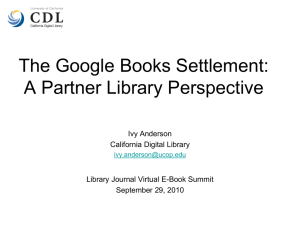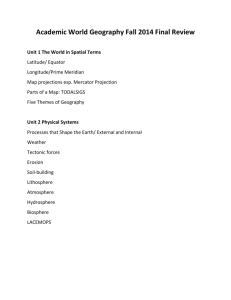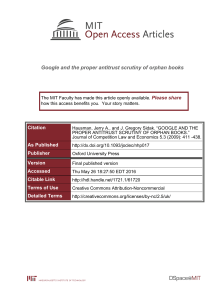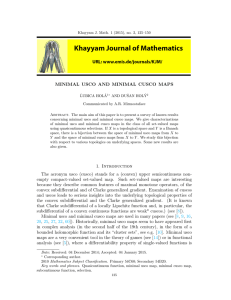Electronic Course Content (E
advertisement
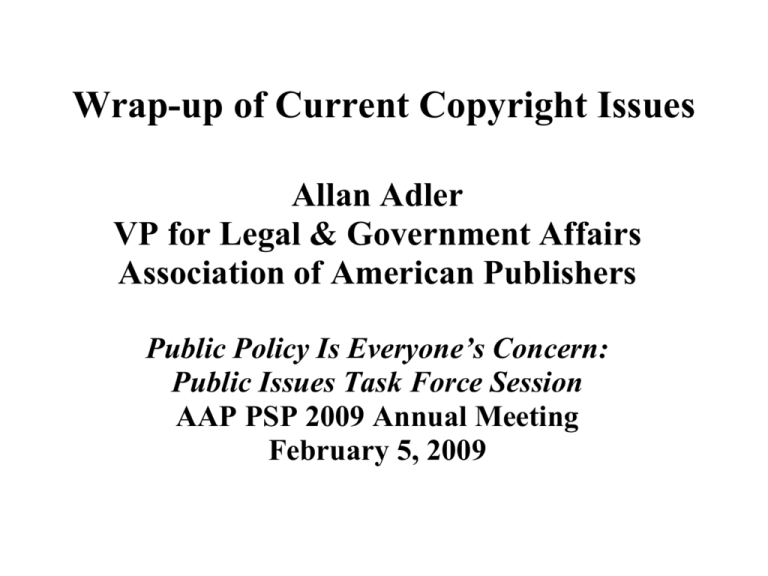
Wrap-up of Current Copyright Issues Allan Adler VP for Legal & Government Affairs Association of American Publishers Public Policy Is Everyone’s Concern: Public Issues Task Force Session AAP PSP 2009 Annual Meeting February 5, 2009 Issues for Review • Where has Allan been lately? CPSIA • Electronic Course Content (E-Reserves) • Google Litigation Settlement • Peering Ahead: A New Administration, A New Congress, and Some Old Business Consumer Product Safety Improvement Act (CPSIA) • 2008 Response to highly-publicized reports of Chinese-manufactured toys containing lead • All “children’s products” must be tested and certified as within “total lead content” limits • Children’s books – previously unregulated by CPSC – now, dangerous until proven safe! • Retroactive applicability to inventory • Even PSP members have children’s books… Electronic Course Content (E-Reserves) • Digital successor to print “course packs” under 1990s Kinkos and MDS court decisions. • Evidence shows widespread campus use directly substitutes for print course packs, w/o permission or fees, and often serves as exclusive curriculum reading materials for many courses. • Problem exacerbated by Nov. 2003 statement of ARL: “Applying Fair Use in the Development of Electronic Reserve Systems.” • Basic concept: Any use of copyrighted course content that requires permission as part of a print course pack likewise requires permission when made available for such use in a digital format. AAP Actions on Electronic Reserves • FAQs about Electronic Reserves” (6/04) • “Dialogue” with UC San Diego and UC OGC on UCSD and UC policies/practices (12/03 – 6/05) • Desktop research led to discussions with Cornell University & joint announcement of new Electronic Course Content Copyright Guidelines (9/06) • Phase 2 – similar approach to multiple schools – resulted in similarly announced new guidelines at Hofstra, Marquette & Syracuse (1/08); later, Duke • Phase 3 – Suit Against Georgia State University Basic Elements of Copyright Guidelines on Electronic Course Content • To the extent permission is needed to include a copyrighted work (or portion thereof) in a print course pack, it also would be needed for course use of such material as electronic course content. • Fair use applies to electronic course content in the same way it applies to printed course packs. There are no bright-line rules; in each case, whether fair use applies depends on circumstances involved. • First-time use, Internet availability, etc. are not dispositive factors for “fair use” determinations. Georgia State University Litigation • Filed in April 2008 by Oxford University Press, Cambridge University Press & Sage Publications, with support from AAP • Early settlement process discussions with State Attorney General’s Office fizzled out; GSU hired private counsel; parties proceeding with discovery • Complaint amended to include individual Georgia Board of Regents members as named defendants – “sovereign immunity” issues • Discovery to be extended past March deadline • Trial? Cross summary judgment motions? Settle? Google Settlement Agreement • Announced in October 2008, class action settlement would resolve both pending suits • Settlement releases Google from liability for scanning in-copyright works without permission, and establishes “going forward” framework for Google & copyright owners to work together through new Book Rights Registry to provide online access to books through various access/revenue models • Key Dates: January 5, May 5, June 11 • http://books.google.com/booksrightsholders/ New Administration, New Congress and Some Old Business • • • • • • • PRO-IP Act of 2008 – “IP Czar” Elimination of House IP Subcommittee Boucher to chair House Telecom Subcttee Departure of key House & Senate staff Orphan Works legislation – 3rd time charm? Section 108 Study Group Recommendations? Freedom of Speech issues: “libel tourism” and “federal shield law” (i.e., confidential source protection) Orphan Works • Jan. 2005 – USCO NOI defined problem • Jan. 2006 – USCO issued its “Report on Orphan Works” and recommended a legislative approach • Mar. 2006 – AAP testified before the House Subcommittee, asked by the Chairman to negotiate a bill based on USCO recommendations • May 2006 – “Orphan Works Act” (HR 5439) introduced & approved by Subcommittee, but then stalled in full House Judiciary Committee • May 2008 – HR 5889 & S.2319 introduced • September 2008 – S.2319 approved by Committee and passed by Senate, but efforts to move in House fail Key Elements of “Orphan Works” Legislation • Reasonably Diligent Search for Copyright Owner – informed by “best practices” on USCO site • If unsuccessful, infringing use OK with attribution • Limitation of Remedies – no award of actual or statutory damages or attorney fees or costs; no injunction for use in new work with compensation • Only “reasonable compensation” if owner appears, except none for certain nonprofit uses that cease expeditiously upon notice of claim; may get award of full costs, including attorney fees, if infringer fails to negotiate compensation in good faith. • With provisions on sovereign immunity; report to Congress; small claims inquiry by USCO. Thanks for your kind attention. Allan Adler adler@publishers.org 202/220-4544
